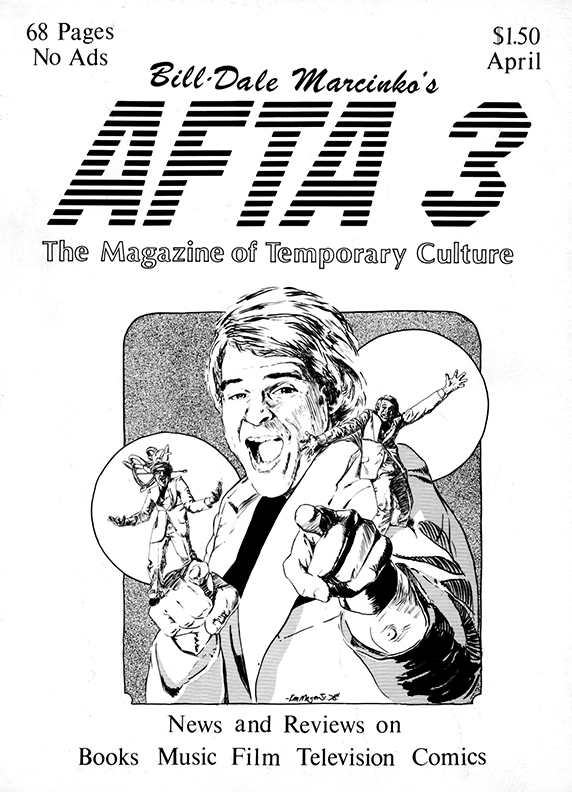
Several people have, over the years, asked for a column on AFTA (Ascension from the Ashes), Bill-Dale Marcinko’s text heavy combination of diatribe, opinion, news, reviews, humor, humanity and farce. I have a personal investment, since I did the cover of this issue and have a few spot illustrations inside, but actually, that is part of the reason I have hesitated, as I don’t want this column to seem self serving. But, probably the main reason is more practical, and that is the fact that this zine is like few others, and does not have the more common visual stimulation that other zines had. That is, art. It is also hard to categorize. Considering Marcinko was a big comics fan, there really isn’t that much comic book content (at least in this issue). As I said, there certainly isn’t anywhere near the “industry standard” amount of artwork. No pin-ups, no art on the back cover, very few spot or article illustrations inside. Also, no fan fiction, no articles on the strength of the Hulk vs the Thing.
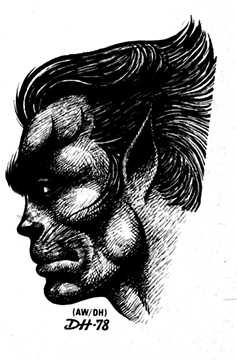
What there is, is content…and lots of it. The subtitle of the zine is The Magazine of Temporary Culture, and this means a ton of tv reviews, movie reviews, comic reviews, book reviews, news of upcoming projects in most of those fields, and a host of crazy ephemera that Marcinko felt compelled to get out of his crowded cerebrum. BD was opinionated, and he felt very strongly about those opinions. In his opening editorial, Words from Bill-Dale, he gives some backstory on his life, and what he wants to do with the zine. It requires the reader to invest not a small amount of time, but it is worth it. Bill-Dale was a deep thinker, but he was also a deep feeler. It may be this trait that led to his death in a fire at his house, fueled by a tonnage of books, magazines, comics, records and, like the contents of this zine, everything else.
The latter part of this column will actually be a guest column of sorts. My good friend and best model of a human being, Clifford Meth (also a very competent working writer with many, many credits…and many more uncredited gifts to the literary world), will be providing the “inside” view (He is pretty darn humble and will most likely balk at my flattery, but to that I say, kiss mah butt!). He went to high school with Marcinko, and later, college. They drifted in and out of each other’s life, but I could tell from a recent phone call how much Cliff admired and respected Marcinko. It was Bill-Dale, after all, who introduced Cliff to the world of fandom, and many people in it who became life long friends (easily not the least of which was the incredible Harlan Ellison). Marcinko and Meth were both outsiders to some degree, not fitting (or choosing to fit) in any of the usual high school cliques, though very different sort of outsiders from each other. This phone call I had with Cliff lasted for about half an hour (the guy can talk…and he can keep you enthralled pretty easily), and it is this, in addition to a column Cliff wrote years ago about Marcinko’s death (which you can read here), that will form the bulk of this month’s installment.
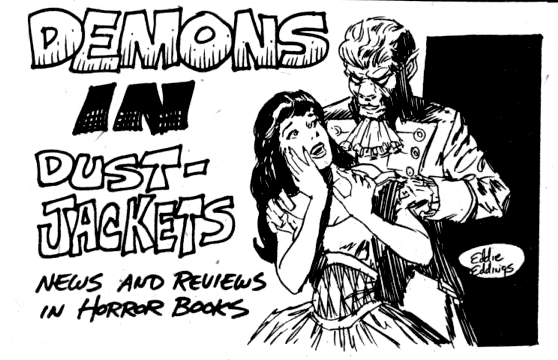
First, though, let’s run through the content of the actual zine. At the top of the column, you see my Steve Martin cover (inside is the Steve Martin Concordance, which transcribes much of Martin’s material and dissects it’s appeal). Following that is Afta-shocks, the letters column (many of the letters are made up bits of humor from Marcinko). Then Where Are You Going, Where Have You Been, Marcinko’s lament on the dearth of outrage among the youth of the 80s vs that of the 60s (or, really, that dearth among pretty much everyone). That is followed by Prophet, Profit, examining the status of several members of the vanguard of activism, mainly in the music biz (Dylan, Baez, etc). Following that is a book review section, including one focused on horror work (the accompanying art seen above), as well as a sub column of sorts, Let Us Now Praise Stephen King (this was around the time of Night Shift).
A music section is next, including subsections covering Punk VS Power Pop, record reviews, and album reviews (Slipped Discs…don’t know why those two are separated). The comedy section is next, breaking down why we like comedy in the first place, as well as examining the various types of comedy (irony, sarcasm, farce, etc), news on Monty Python, Robin Williams, comedy on the radio, the Steve Martin article, a short bit on Proctor & Bergman (Firesign Theatre), tv comedy reviews and news, film comedy….see, Bill-Dale liked to be thorough!
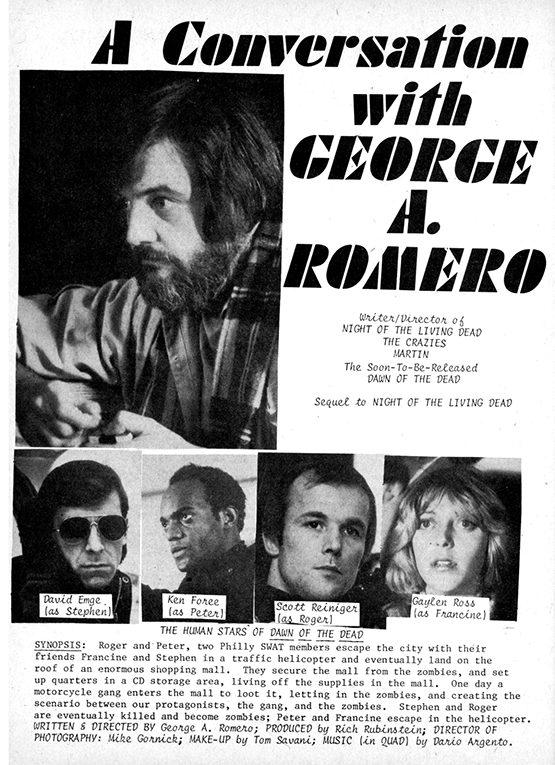
Suspension of Disbelief, a column on fantasy/sf film comes next, and within that, probably the biggest “catch,” an interview with Night of the Living Dead director/writer, George Romero. I think, by this time, Bill-Dale was a student (and student teacher) at Rutger’s university (where, according to Cliff, he had a bonafide cult following of his own), so perhaps he scored the interview with the help of the film department, I am not sure. Cliff directed me to a good article out of Rutgers that chronicles Marcinko’s contentious stay at the college here.
Also in this issue are several diary entries from Marcinko, some song lyrics, A Return to Intimacy, TV News and Reviews, Kool-Aid, Anyone?, a rare non-Marcinko column (Random Samplings, comic reviews by Ed Via), and a fictional sort of National Enquirer parody, National Mind Sampler. I told you there was a wide variety of material, didn’t I?
Ken:
Okay, so how did you ever even come in contact with Bill-Dale Marcinko?
Cliff:
Bill-Dale Marcinko and I went to Morris Hill High School. He was from Wharton, New Jersey. I was from Rockaway. Our two towns shared the same public high school. It was a fairly large school. Each class had about 400 students in it.
Ken:
Wow.
Cliff:
I entered in 1975, and when I was a freshman, he was a junior, but he was graduating early. So he was already a junior/senior. He finished high school in three years. He was a very, very smart guy. We were not from the same circle at all.
Ken:
(laughs)
Cliff:
I was an athlete who didn’t hang around with athletes. I hung around with fighters. And I was a good student who didn’t hang around with smart, good students ’cause I couldn’t stand them.
Ken:
(laughs)
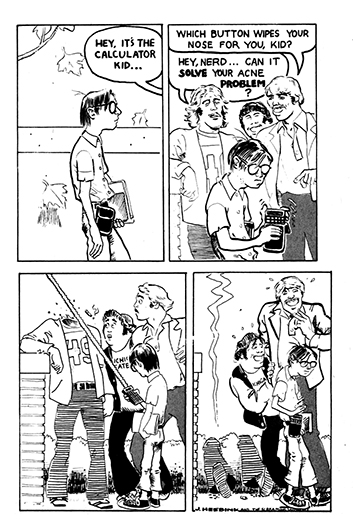
Cliff:
Bill, or Bill-Dale, as most of us called him, was a super-smart guy. Terrific grades. Everybody knew how brilliant he was. But, but he was also very quirky. Had no problem being a real nerd. He liked being a nerd. I never would’ve been in his circle in any way, shape or form, but he was producing, not just in, but actually producing a play called, When You Comin’ Back, Red Ryder, by the playwright, Mark Medoff.
Ken:
Okay.
Cliff:
Medoff went on to do some other excellent plays. A girl that I was friends with suggested that I try out for the play, and I did. Bill and I ended up being cast—I mean, he’s actually the one who cast me—and we were opposite leads in a play about a maniac and a tough guy who end up facing off in a diner. The play would be very much a metaphor for our friendship.
Ken:
(laughs)
Cliff:
I was a tough 14 year old when he met me and he was a very strange 17 year old, who introduced me to all sorts of cultural phenomena that I would’ve had no exposure to at that point in my life. He took me to a Star Trek convention with a couple of other friends of his. First time I ever saw Harlan Ellison read. And he was the one who sent me over to talk to Harlan.
Ken:
Wow. That’s a big deal.
Cliff:
He suggested that I ask Harlan “Ae they gonna be censoring you today?” So, as a 14 or 15 year old I walk over to Harlan Ellison, who was in his early 40s, and asked, “Excuse me Mr. Ellison, they’re gonna be censoring you today, correct?” And he goes, “Kid, do you even know who you’re fucking talking to?” (laughs). It was my intro to Harlan! It was my intro to lots of things. Bill was an extremely generous guy and my father was always suspect of his generosity because he was clearly, uh, very strange.
Cliff:
You know, to his, to his straight friends, he was gay. And to his gay friends, he was straight.
Cliff:
And that was a very odd combination. My father was very concerned about my spending time with him. It’s funny. I mean, I hung around with killers and my father wasn’t worried about it. But Bill Marcinko put my father’s teeth on edge.
Ken:
(laughs)
Cliff:
So, like I said, Bill took me to various things; he gave me a subscription to RBCC and he introduced me to writers like Howard Chaykin, and other writers who I never would’ve even looked at, you know. I was just into super-hero things at that age and the artists illustrating them…
Ken:
Ah. Okay.
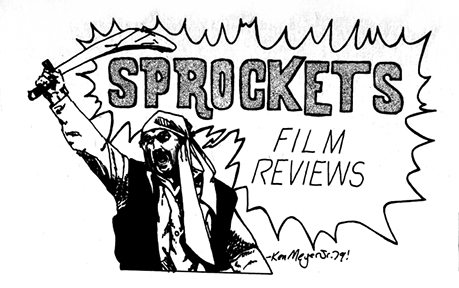
Cliff:
… and he started introducing me to better writers and films that I didn’t even knew existed. And there were a couple of people in his circle who ended up in fandom for, you know, forever. I don’t really run into them anymore. There was a woman named Brenda Mings and… God, I wish I could remember some of the other people. They sort of disappeared. I didn’t become friends with any of them. But Bill had an enormous influence on me. Unfortunately, he was also… whether he was pursuing me sexually or not, it started coming off that way and it got too weird.
Cliff:
And then because I was uncool about it, he got nasty. And we had a real falling out. I mean, like a bad falling-out. It was like, it’s done. It’s over. I said, “Stay the fuck away from me.” And he was very angry about that ’cause I didn’t want him… But I owed the guy. I really owed him, you know. I’d learned a lot from him. But nevertheless, it was frightening to me at 15.
I didn’t swing that way. I wasn’t ready for a friend like that and it was so outside of the purview of my entire worldview. It just got weird. And so, we didn’t talk. And he graduated high school and went to Rutgers. I graduate a few years later. I go to Rutgers and there he is and immediately we were friends again. Now I was ok, you know. It didn’t make a difference what he was sexually, or wasn’t, or how weird he was.
So, we renewed our friendship and spent some time together. He invited me to write for the Livingston Medium, which was one of the campus papers that he was the Editor in Chief of. He had already founded AFTA, which I was also invited into as, as you recall, as you were involved with AFTA.
Ken:
Yeah. Yeah.
Cliff:
So we sort of drifted in and out, and I was only at Rutgers for a year because I ended up getting thrown out for fighting (laughs). So, once again, Bill dropped out of my life.
Cliff:
We did correspond a little bit. I remember he was having trouble. They were trying to throw him out. He was actually teaching at that point. He began to student teach. I don’t know if he was going for his Masters Degree, or if he had graduated. At that point, he was teaching at Rutgers. But they came after him for his politics and for his outspokenness. Rutgers was one of the first schools with a gay alliance, the RGA—the Rutgers Gay Alliance. And he was very involved in that. But you know, we’re still talking 1983, ‘84.
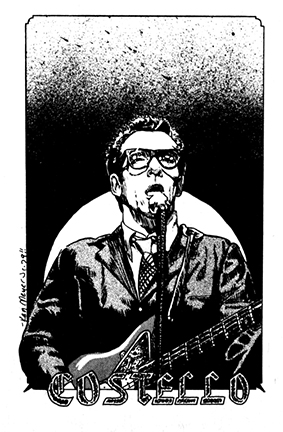
Anyway, Bill and I lost touch. I graduated. But I like to stay in touch with people. I’m pretty good at that, especially if they become important to me. So, Bill is somebody that I kept trying to find…where did he go? And finally, one day, I drove up to his parents’ house in Wharton. And it was at the same address and there was this old car in the driveway. And the house was all dilapidated, but same old house, you know. This has got to be 15 years ago. I wrote about it at the time.
Bill came to the door. Now Bill had always been overweight. Always. But not this time. He comes to the door and there’s this really skinny Bill-Dale Marcinko. Almost emaciated, like he wasn’t eating right. And I said, “Bill, Clifford Meth.” He looks and goes, “Hey, come on in.” And again, we haven’t looked at each other in the eye in, I don’t know, 25 years. So, he invites me in and his entire house was… I remember, the first thought I had was firetrap. We’re talking about piles and stacks of books and comic books and magazines. Clearly he was in the business of buying and selling, and, as it turned out, I was right. He had a nostalgia business of sorts. He was selling nostalgia, which made so much sense, for this guy to be in that business. On the other hand, it made no sense for a guy with his intellect to be doing nothing else but selling shit on eBay and the internet.
Ken:
Right. Right.
Cliff:
Because he’s a brilliant guy. A smart writer. A good producer. A good director. He had a lot of talent. And the coming of the internet should’ve been an opportunity for him to become a podcaster or so many other things that would be real creative outlets, as opposed to selling somebody else’s stuff. I’m not attacking somebody who does that for a living—that’s fine. But this was a guy who was born to also create. And he wasn’t. We sat down and had a coffee at his table, and he made it very clear that he had no interest in saying anything to anybody until he had something to say… Whereas, the Bill-Dale that you and I knew had a lot to say about everything.
Ken:
Right (laughs).
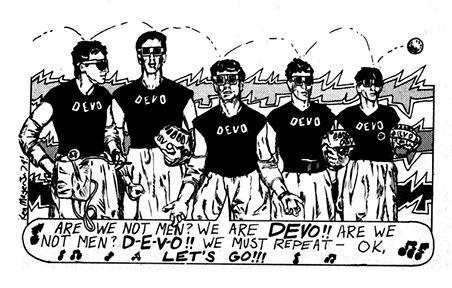
Cliff:
I mean, this was a guy who was filled with opinions and filled with rage and filled with fiction. A lot of his life was fiction. He created a number of different personas. But, I remember feeling horrible for him. I felt like, this poor guy, he didn’t seem at all happy. There he was behind these very thick glasses, which was always characteristic of him. He had these coke bottle like glasses. Clearly, blind as a bat without them. And, sitting there…just very small, at his table. Well, it wasn’t long afterwards that the word firetrap came back to me because his house caught on fire… and he died in that fire.
And I remember, I heard about it that day, I guess. A mutual friend told me. And I was so sad that his sad life had ended like that. I can’t even imagine being in a fire. But the guy was alone, you know. And this was not a guy who was meant to be alone. I mean, at Rutgers, he had a cult following…and it wasn’t just people who were into whatever stuff he was into. It was people who appreciated the power of his charisma. He had an intelligence and this charisma and this was a guy who literally had a cult. And I wasn’t part of it (laughs).
Cliff:
At Rutgers, he didn’t go anywhere without an entourage. And he didn’t just didn’t have conversations— he held court. So I observed that the whole year that I knew him at Rutgers. And I thought, there are opportunities for somebody like this as they get bigger and as they become more conscious of their power and who they are. But there was also a certain madness that he could apparently never really get past. I don’t know. A sadness or a madness.
Ken:
I was gonna ask, ’cause if I remember right, didn’t he fake his death at some point before that? And even the same method or something?
Cliff:
Yeah. Yes. He faked his death and he used me, he used me as the vehicle. Around my senior year in high school, Bill was involved in fandom, actually before then. And, when I say involved in fandom, he wasn’t just a guy who was buying and selling, I remember him being very critical of Alan Light and Gary Groth and everybody who was making money in the business. Because he saw comics as a very pure thing, an industry of ideas, not as an industry that people should be taking advantage of. This is a guy who didn’t care about money. He had a real hippy ethos about him. Did not give a shit about making money. He was a super generous guy who gave things away. And he was not a wealthy guy from a wealthy family. I remember he had some kind of job on the side but he never talked about it. But he liked to buy gifts for people. He wanted to share culture and ideas.
So, the faking of the death, ah, okay. He was doing some fandom work, writing or something, before AFTA and I wish I could remember what it was. But then he got it in his head that he wanted his own magazine. And somehow he convinces Steve Martin to give him an interview and he convinces, George Perez to do his first cover. I mean, he had a lot of people helping him. He wasn’t paying anybody, you know. He wasn’t paying professionals, but I think he paid some of the amateurs… I remember the fanzine called No Sex.
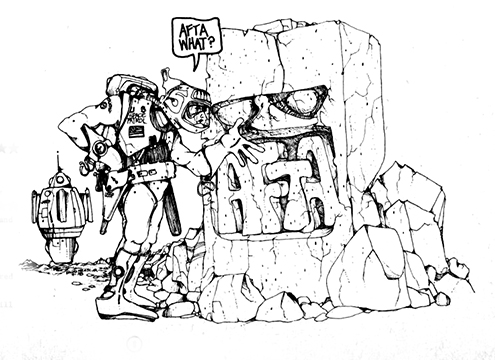
Ken:
Yes, that was by David Heath Junior.
Cliff:
Right, he introduced me to David.
Ken:
Oh, okay.
Cliff:
… and he knew a lot of people — he was always introducing me to other people within fandom. It was like he knew everybody! And people were willing to help him. So, while he was planning AFTA, all of a sudden he gets it in his head that he has to die. So he writes a letter reease that he sends to The Buyers Guide and to TCJ, or whatever it was called back then. And, and anybody else who was publishing. And he sent it out in my name (laughs)! Stating that he’d been killed in a car accident.
Ken:
(laughs)
Cliff:
And people should contact me. By the way, he didn’t tell me he was going to do that. He just did it.
Ken:
(laughs)
Cliff:
And of course, the phone calls and the letters came to my father’s house. You know, nobody had a cell phone. There were no cell phones in 1979. We had one phone in the kitchen. And my parents were answering the phone and people inquiring about Bill-Dale Marcinko’s death… And the letters would come to my house. And then all of a sudden there was the Ascension From The Ashes.
As Bill-Dale Marcinko rises, you know, Lazarus-like, from the ashes, to save fandom (laughs). And it was smart. It was clever. He pulled it off. He got attention. There were people who were annoyed, but the point was, he was able to pull it off. I wasn’t even angry. I remember being very impressed by it—the fact that you could use sensationalism at that level, that at 19 years old, he was able to do something like that and launch his little magazine.
I learned a lot from this guy. I learned a lot, but, he was quite a character.
Ken:
Yeah.
Cliff:
That was his first death.
Ken:
Did he either help you with some professional contacts, or did you try and help him with any kind of contact to get him writing work? Anything like that happen?
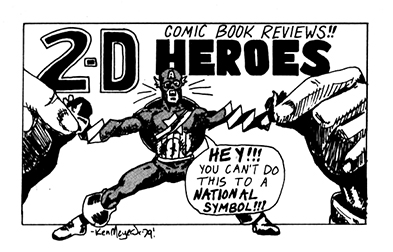
Cliff:
Well, early on, I’m 15, 16, 17, you know. Even at Rutgers, I was only 18. It ended at that point. When I left Rutgers, it ended. Now, by the time I found him again, I can’t remember exactly, let’s say it 15 years ago, I was pretty well established. And I offered to help him. You know, I was sort of, “You know, Bill, I’m pretty connected right now. I’m doing a lot of things. Of the celebrities whose work you introduced me to, half of them are my friends now.” And he had zero interest.
Ken:
Okay.
Cliff:
Zero interest in doing anything professionally. He was selling records. He was selling vinyl. He was selling magazines on eBay. He had inherited his parents’ home. They’d both died. And he didn’t seem to need much or care very much… He was stuck. He was trapped.
Bill-Dale is gone. But, he has left us with AFTA. Only three issues, but these issues are so expansive, so Bill-Dale, that they might be the best example of the breadth of what made Marcinko what he was.
Huge thanks go out to Cliff Meth for the time, insight, and information he gave to me. Please feel free to comment below, so we know all our time was not wasted, and tune in next month for another installment and another blast from the past!
Ken Meyer Jr.
kenmeyerjr@yahoo.com


Pop culture cross over. I look forward to reading it.
Thanks, Ron!
Bill-Dale had a trainload of creativity and a great deal to offer. Relatively speaking, he accomplished quite a bit in a short period of time. If I had to guess, I’d say it was his failure at Rutgers and being tossed by the Livingston Medium—which he all but created—that ultimately did him in. Failure and rejection weighed heavily upon him. He wasn’t ready for another round, so he retreated to a safe space and died in it… AFTA was important in its day. You did a great job, Ken, of boiling down the experience of that publication.
Your time was not wasted in the least. As someone who contributed to the first two issues of AFTA, I had my own exposure to Bill Marcinko, but it was limited. Just letters back and forth. I wrote a column about movies — Screen Horizons. Fascinating interview about an odd character.
Thanks for commenting, Cliff and Dana, always makes it seem more worthwhile!
The thing I remember about being involved with AFTA is that after I turned in my column for the 2nd issue, he wrote me a letter saying he’d received reports that I was “RBCC’s hatchet man,” (I was writing as Mark Burbey back then) and that he wanted to re-evaluate my involvement with AFTA. And yes, I might have had a reputation for writing occasionally harsh reviews of fanzines, but my film column in AFTA had nothing to do with that. At the end of my column in #2, he added a comment saying I’d resigned, and complimented my two-part article about Brian De Palma in RBCC. The fact of it was that I’d quit, because I wasn’t going wait and hope he’d allow me to keep writing this column for free. It was fun while it lasted, I enjoyed writing the column. Odd that that wasn’t enough for Bill.
Dana- His self-destructive tendencies were the evident very early on.
Great interview and that Costello piece is magnificent!
Thanks, Matt! I have depicted Elvis a buncha times over the years…that was probably the first time, considering the date. I think I have painted him at least 4 other times, maybe 5.
I just stumbled across this. I loved AFTA at the time, both in its original digest-sized incarnation and the larger, bordering-on-professional-but-still-weird issue you scanned. Its tagline may have referenced “temporary culture,” but now it’s a meaningful snapshot of a period that gave us some stuff of lasting interest (including Steve Martin).
I had no contact whatsoever with Bill-Dale–I must have bought AFTA at a con or Harvard Square’s Million Year Picnic–but I found him fascinating and am sorry his story had such a sad ending.
Anyhow, thank you for this and for your whole site, which I’m going to delve into.